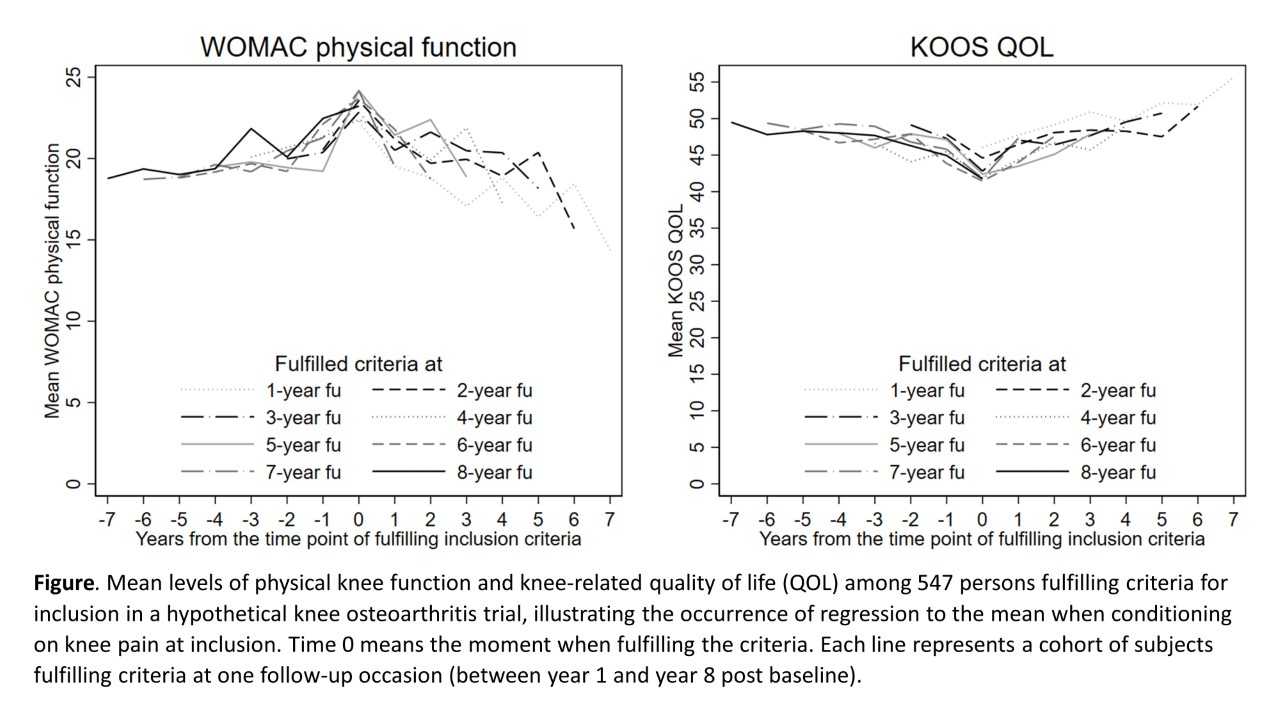Session Information
Session Type: Abstract Session
Session Time: 4:00PM-5:30PM
Background/Purpose: Improvement in pain reported in clinical trials for osteoarthritis (OA) is typically strongly depending on the regression-to-the-mean phenomenon. Regression to the mean has been estimated to explain about 1 NRS point (0-10 scale) of the absolute improvement since baseline. However, the potential effects of regression to the mean on typical secondary outcomes in trials for knee OA are unknown. Thus, our purpose was to estimate the absolute size of improvement in knee physical function and knee-related quality of life (QOL) explained by regression to the mean in a typical trial for symptomatic knee OA.
Methods: We included participants of Osteoarthritis Initiative who fulfilled inclusion criteria typically required for enrolment in a clinical trial (Hochberg et al. JAMA 2019). These included: age 40-79 years, symptomatic knee OA, Kellgren-Lawrence grade 2-3, use of pain medication more than half the days of a month in past 12 months, numerical rating scale (NRS) pain of 4 to 9 in the target knee. We studied observed changes in the mean levels of WOMAC physical function (scale 0 to 68; higher score = worse function) and KOOS QOL (scale 0 to 100; higher score = better QOL) with respect to conditioning on current knee pain. To account for the fact, that a person could fulfil the criteria at more than one time point and the longitudinal measurements, we used linear mixed models for estimation of means and differences over the follow-up time.
Results: We identified 547 subjects who fulfilled inclusion criteria on at least one annual follow-up between year 1 and year 8. The mean level of WOMAC knee physical function and KOOS QOL at each follow-up time point was similar, about 18, and 52 respectively. However, at the time of fulfilling the inclusion criteria (theoretical inclusion in a trial), the mean level of physical function and QOL in the same subjects were about 23 and 43, respectively. The mean improvement in WOMAC physical function between the theoretical point of inclusion in a trial and one and two years later, was -2.5 (95% CI to -3.2 to -1.7 ) and -3.1 (95% CI to -3.8 to -2.3 ), respectively. The corresponding improvement in KOOS QOL was 2.7 (95% CI ,1.7 to 3.7) and 4.2 (95% CI, 3.1 to 5.3) (figure).
Conclusion: Regression to the mean in typical trials for knee OA is not only likely to explain substantial improvement in pain, but also albeit to a lesser extent, improvement in knee function and QOL. Regression to the mean is a phenomenon that often misleads the investigators to exagerate effectiveness as the phenomenon neither represents improvement from the intervention nor placebo response from the intervention and its context.
To cite this abstract in AMA style:
Englund M, Turkiewicz A. Regression to the Mean for Physical Function and Quality of Life in Trials for Symptomatic Knee Osteoarthritis [abstract]. Arthritis Rheumatol. 2023; 75 (suppl 9). https://acrabstracts.org/abstract/regression-to-the-mean-for-physical-function-and-quality-of-life-in-trials-for-symptomatic-knee-osteoarthritis/. Accessed .« Back to ACR Convergence 2023
ACR Meeting Abstracts - https://acrabstracts.org/abstract/regression-to-the-mean-for-physical-function-and-quality-of-life-in-trials-for-symptomatic-knee-osteoarthritis/

